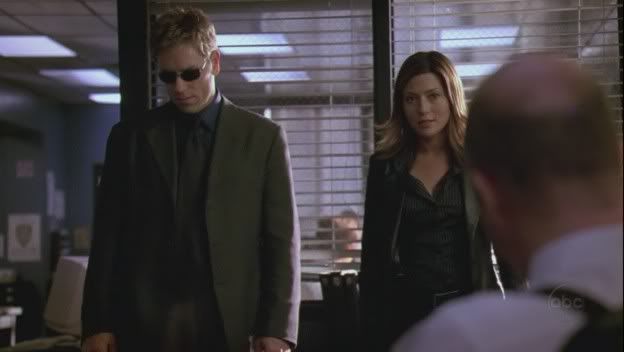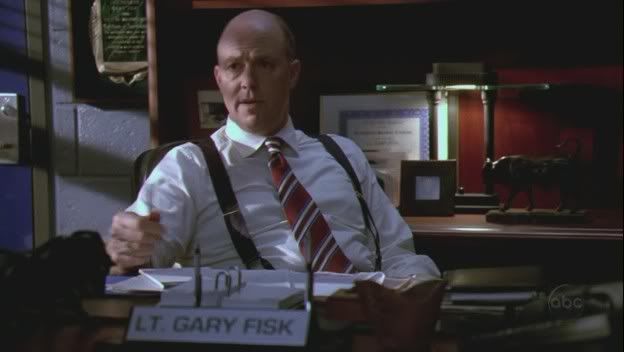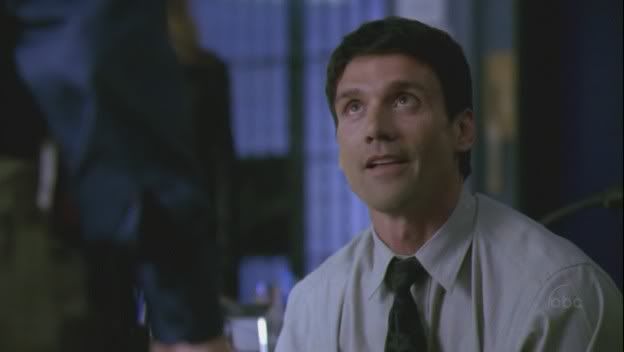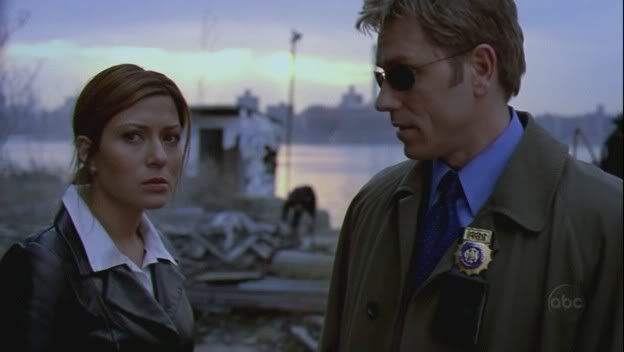|
|
Post by maggiethecat on Feb 24, 2006 18:17:27 GMT -5
Fisk did what needed to be done. It was going to be a difficult first day for all concerned and laying it out for Jim was probably the kindest thing to do. His choice of words is sometimes questionable--"if you remember" and "be honest" stands out--and while he was just being honest, they seemed a tad bit cruel. Let's get going again! We all now seem to be pretty much on the same page where Fisk is concerned re that first meeting with Dunbar. That said . . . what about the scene where Fisk accuses Jim and Karen of grandstanding, demands they turn their case notes over to Selway and Russo, and sends them off to pursue a $9 kited check at a Chinatown restaurant? (More Medals of Honor at stake.)  Were Were they grandstanding? Was Fisk considering only the source and thereby effectively shutting down a new direction in a case that had grown cold? Was he taking this tack simply because the lead came from the new guy, the high profile "blind dude" he'd been handed like a subpoena?  Was this a righteous call? Or was Fisk just being (you should pardon the language) a hardass? |
|
|
|
Post by Duchess of Lashes on Feb 24, 2006 19:31:43 GMT -5
Hardass! I have no doubt that much of what Fisk did was an unwarranted push to make Jim conform/quit. Having said that, though, I don't believe the motives were necessarily that cut and dried or black and white. He had the best interests of his squad, and even Jim, in mind, wanting to remove all of them from the potential risks associated with working with a blind cop, or being a blind cop. He's just had the first one dumped in his lap, there's no case history to fall back on. He made it clear that no one wanted to go out on the street with Jim; Jim made it clear that he didn't want to stay in house and be a "civilian aid", that he was still a Detective, that he wanted to do his job, to prove that he was still capable and if he wasn't, then he'd quit.
Fisk was going to make sure that the aspects of the job would be the deciding factor as to whether Jim would stay or go, and I think purposely demeaned the cases for Jim and Karen, backing Jim into a corner, hoping that he wouldn't have to make the decision for him. Thankfully Jim's resolve was matched by his tenacity - backed into that corner, he came out swinging, proving not only to Fisk but to the squad that there was more than one way to solve a case, that he could still do the job and had, at the end of the day, earned the right to continue to try.
|
|
|
|
Post by mlm828 on Feb 24, 2006 20:15:01 GMT -5
. . . what about the scene where Fisk accuses Jim and Karen of grandstanding, demands they turn their case notes over to Selway and Russo, and sends them off to pursue a $9 kited check at a Chinatown restaurant? (More Medals of Honor at stake.) Were they grandstanding? Was Fisk considering only the source and thereby effectively shutting down a new direction in a case that had grown cold? Was he taking this tack simply because the lead came from the new guy, the high profile "blind dude" he'd been handed like a subpoena? Was this a righteous call? Or was Fisk just being (you should pardon the language) a hardass? Now that I think of it (thanks, maggie!), there is a lot going on in this scene. Part of it is pretty simple: Fisk just doesn't believe Jim when he denies withholding information about the latest victim, Lynn Bodner. Fisk is not going to stand for that. I have to part company with Lori on one point she makes. I don't think Fisk would realistically have had any expectation that he could get Jim to give up by demeaning him and assigning him to minor cases. After all, Jim basically strong-armed the NYPD into putting him back on the job. I think Fisk would know Jim is not someone who would give up that easily. This leads to another aspect -- the accusation of "grandstanding." I think Fisk did suspect that's what Jim was doing when he withheld information about Lynn Bodner in order to pursue his theories himself. (We know his suspicions are accurate, based on Jim's conversation with Karen at the scene about not wanting the case pulled from them for bogus reasons). Even though Fisk was not privy to that conversation, he has reason to believe this is what Jim was doing. He probably shared the general belief that Jim was a publicity hound, because of the role of the press in his reinstatement. (If I remember correctly, Jim's statement to Tom that he hadn't gone to the press is after this scene, and I'm not sure Fisk heard it anyway). And based on Jim's tenacity in pursuit of reinstatement, Fisk probably thought Jim would stop at nothing to prove himself capable of doing the job. It probably can be summed up in one word: trust. I think Fisk simply did not trust Jim at this point in time. And, yes, I think Fisk was being a hardass -- but not simply for the sake of being a hardass. It's his job to be a hardass, and he probably thought there were good reasons for him to be a hardass in this instance. |
|
|
|
Post by hoosier on Feb 27, 2006 17:51:29 GMT -5
I believe that Fisk knew Jim's record on solving cases because I can not imagine him not thoroughly familiarizing himself about the new guy. But that was Jim's record then and this is now and he would be operating under totally new and different circumstances. Of course, Fisk is concerned about how Jim will work in the field, safety issues aside, and maybe the petty cases were one way for him to guage how Jim will handle himself, see how effective he can really be and also give Jim a chance to get his feet wet. After all, he has been away from the job for a year!
As for the Bodner case-- You could argue that Jim didn't know all the particulars of the Tongue Collector case. He did ask what had been kept out of the papers and never was answered. Bodner didn't fit all the criteria, as he knew it. It could very well have been random violence, a trick gone bad so to speak, so acting on a presumption he and Karen bounced around the idea that she was a victim and that he had been either scared off, interrupted before he could do his "little thing of cutting her up" and ran with it. And it was Karen who told Fisk that Bodner had been out "taking pictures" and Fisk went along with it even though he could see the fishnets and leather mini, rather strange attire for an evening of "photo shoots". Maybe Karen wanted to see for herself how it played out since she had been yanked off the case to play chauffeur.
I also am of the opinion that Fisk was a hardass but more from necessity. He had to establish the pecking order for Jim--he (Fisk) was the Boss who assigned cases for serial murders and for $9 bad checks and Jim was the new guy and low man on the totem pole even if he had 10 years of experience. He was not there to make Jim happy, his new life easy or to hand him a high profile case on a platter. He was part of a team and Marty and Tom were the lead detectives on the case. I did love how he was a tad bit uncomfortable when Karen piped up with her "like me" when Fisk pointed out to Jim that he didn't have intimate knowledge of the case unlike those detectives who had put in hundreds of manhours. I was cheering "good for her!" , getting her two cents in. Thats probably how she made detective at such a young age--standing up for herself.
|
|
|
|
Post by hoosier on Feb 28, 2006 17:34:09 GMT -5
I happened to watch the Pilot today and looked especially close at Fisk and the phone. When Jim came in, I couldn't see him in his office, then he was waving his phone when they looked in and then when they looked again a convenient bar was blocking the view! I still am of the belief that Fisk used the phone as a delaying tactic and let the squad run some interference until he was ready to come out and meet Jim. My take anyway  |
|
|
|
Post by inuvik on Feb 28, 2006 17:38:22 GMT -5
I happened to watch the Pilot today and looked especially close at Fisk and the phone. When Jim came in, I couldn't see him in his office, then he was waving his phone when they looked in and then when they looked again a convenient bar was blocking the view! I still am of the belief that Fisk used the phone as a delaying tactic and let the squad run some interference until he was ready to come out and meet Jim. My take anyway  I tend to agree. If you are on the phone, you don't wave it around because then you miss what the other person is saying. And if you are speaking, the other person won't be able to hear you. If Fisk was on the phone, the squad would have been able to see that anyway. There would be no need to wave the phone. I think Fisk waved the phone so that they would tell Jim that he was on the phone. |
|
|
|
Post by mlm828 on Feb 28, 2006 20:49:41 GMT -5
I happened to watch the Pilot today and looked especially close at Fisk and the phone. When Jim came in, I couldn't see him in his office, then he was waving his phone when they looked in and then when they looked again a convenient bar was blocking the view! I still am of the belief that Fisk used the phone as a delaying tactic and let the squad run some interference until he was ready to come out and meet Jim. My take anyway  I tend to agree. If you are on the phone, you don't wave it around because then you miss what the other person is saying. And if you are speaking, the other person won't be able to hear you. If Fisk was on the phone, the squad would have been able to see that anyway. There would be no need to wave the phone. I think Fisk waved the phone so that they would tell Jim that he was on the phone. I watched the Pilot again, too, trying to figure this out. While Tom, Marty, and Karen are introducing themselves to Jim, the camera pans across the room, and we get a glimpse of Fisk in his office. I paused the recording to get a closer look, and Fisk doesn't appear to be on the phone. But I'm still puzzled about one thing. Fisk comes out of his office almost immediately afterward. If he was pretending to be on the phone as a delaying tactic, it wasn't much of a delay. Why go to all that trouble for such a short delay? |
|
|
|
Post by greenbeing on Feb 28, 2006 21:23:59 GMT -5
I watched the Pilot again, too, trying to figure this out. While Tom, Marty, and Karen are introducing themselves to Jim, the camera pans across the room, and we get a glimpse of Fisk in his office. I paused the recording to get a closer look, and Fisk doesn't appear to be on the phone. But I'm still puzzled about one thing. Fisk comes out of his office almost immediately afterward. If he was pretending to be on the phone as a delaying tactic, it wasn't much of a delay. Why go to all that trouble for such a short delay? Perhaps Fisk had to make a call? Maybe only to tell the Chief of D's that the new media monger detective had indeed shown his face, and that he'd lost the pool where they'd all been betting on whether or not Dunbar would show. Because if the phone was just ringing, it wouldn't need to be at his ear. --GB |
|
|
|
Post by mlm828 on Feb 28, 2006 22:13:22 GMT -5
Perhaps Fisk had to make a call? Maybe only to tell the Chief of D's that the new media monger detective had indeed shown his face, and that he'd lost the pool where they'd all been betting on whether or not Dunbar would show. Because if the phone was just ringing, it wouldn't need to be at his ear. --GB Karma to you, GB! That's the best theory anyone's come up with so far. And I'm still laughing. ;D |
|
|
|
Post by hoosier on Mar 2, 2006 17:53:23 GMT -5
Perhaps Fisk had to make a call? Maybe only to tell the Chief of D's that the new media monger detective had indeed shown his face, and that he'd lost the pool where they'd all been betting on whether or not Dunbar would show. Because if the phone was just ringing, it wouldn't need to be at his ear. --GB Karma to you, GB! That's the best theory anyone's come up with so far. And I'm still laughing. ;D ;D I love it! And if thats the case, the chief was definitely betting on a sure thing since he had already had dealings with Dunbar! |
|
|
|
Post by hoosier on Mar 11, 2006 17:24:49 GMT -5
After watching the Pilot as part of the anniversary celebration  , it seemed to me that when Jim reached into the desk drawer to get his badge and gun, he seemed to hesitate ever soooo slightly when going for his gun. Was he having second thoughts himself about the validity of his carrying a weapon? Sure, he had fought for the right to carry it and had even signed a waiver (which only covered his getting shot, not his shooting someone, as Fisk so eloquently pointed out to him) but now the big day was here and there was no turning back. He had to have had doubts but maybe he never permitted himself to say them out loud. Cops carry guns,he is a cop, the end. One question though-- cops have to qualify on the gun range each year,right? How did they work around that??? |
|
|
|
Post by inuvik on Mar 11, 2006 18:43:20 GMT -5
One question though-- cops have to qualify on the gun range each year,right? How did they work around that??? He must have been exempt because we were told the gun was only meant for close physical contact. Too bad he drew it from a distance on his very first day!  |
|
|
|
Post by mlm828 on Mar 11, 2006 19:14:11 GMT -5
After watching the Pilot as part of the anniversary celebration  , it seemed to me that when Jim reached into the desk drawer to get his badge and gun, he seemed to hesitate ever soooo slightly when going for his gun. Was he having second thoughts himself about the validity of his carrying a weapon? Sure, he had fought for the right to carry it and had even signed a waiver (which only covered his getting shot, not his shooting someone, as Fisk so eloquently pointed out to him) but now the big day was here and there was no turning back. He had to have had doubts but maybe he never permitted himself to say them out loud. Cops carry guns,he is a cop, the end. I always thought he was just feeling around for the gun in the drawer, but it's an interesting theory. Still -- if he had lingering doubts about carrying a gun, I wonder why he reacted the way he did when the Chief of Ds called him on the carpet about drawing the gun in "Seoul Man." Maybe he was just being defensive in that instance. I also wonder why, if he had doubts, it was so hard for him to give up the gun, even after he'd made up his mind to do so. |
|
|
|
Post by greenbeing on Mar 12, 2006 16:18:35 GMT -5
After watching the Pilot as part of the anniversary celebration  , it seemed to me that when Jim reached into the desk drawer to get his badge and gun, he seemed to hesitate ever soooo slightly when going for his gun. Was he having second thoughts himself about the validity of his carrying a weapon? Sure, he had fought for the right to carry it and had even signed a waiver (which only covered his getting shot, not his shooting someone, as Fisk so eloquently pointed out to him) but now the big day was here and there was no turning back. He had to have had doubts but maybe he never permitted himself to say them out loud. Cops carry guns,he is a cop, the end. I noticed the hesitation, too. I've never quite figured out what to read into that moment. First he pulls his badge out, and runs a finger over it. That seems to be a "This is it; I'm back on the job" moment. I never really thought of the gun hesitation as a "should I be carrying this?" moment. I guess I thought of it more in terms of the bank robbery. So much had happened in the past year, based on the gun, which ran out of bullets, leaving him to run willy-nilly to take Terry's weapon. But he was back on the job, it was time to make sure he could do the job. Relief, tension. And also, it could be foreshadowing, showing us that this piece of metal is going to be very important in the upcoming series. There are so many things that can be read into it, and I don't think you can pick just one. Too many emotions running through Jim that morning (which Galloway brought out of him--scared that he couldn't do his job as well as he used to, what was he going to do if he couldn't get his partner's back, what if everyone was right about him, yet, he was a cop, what else could he do but try to do his job, try to prove himself, get out of the house, get on with his life, it was time to move forward, even though he knew as well as anyone that it was the same job that had almost cost him his life, and he'd had to pay a steep price, but he wasn't going to just sit back when he felt there was a chance he could still offer something as a detective...) that all seemed to culminate into that half a second hesitation when his hand touched the gun and the holster. It means so much to him, that gun, good and bad, life, power, and death. Also, it seems a bit of a foreshadowing moment to the last episode, where he hesitates, runs his hand over the gun, then puts it one last time in his locker. In the Pilot, maybe he'd thought he'd never again be in a position, have his life on track enough, to carry that gun. Gun = Detective Dunbar. And it's about time he was Detective Dunbar again. Then, in Fancy Footwork, he knows that when he finally lets go, he's never going to pick it up again. He's still a detective, but there's that uncertainty he had in the Pilot--could he do his job? His life was still changing, not stabilized, even after thirteen episodes. There were things to learn, things he could do better, things he could teach. And while he wasn't ready to step down, he was finally able to step back and say, "I'm more than a gun." Maybe he finally realized that, while he felt he was losing things, he wasn't really losing them at all. --GB |
|
|
|
Post by maggiethecat on Apr 7, 2006 20:44:16 GMT -5
[glow=red,2,300]Announcement![/glow] I do love that glow thingy. All the fascinating posts from the last few days regarding bullets, brains, and how to most effectively damage an optic nerve have been moved to a new thread under Oddities and Analysis called Ballistics 101: How Jim was Blinded. And may the discussion continue! (And may this weary junior admin beg, pathetically, for a little karma since moving all those posts took for ever. I also apologize for everything appearing under the maggiethecat avatar, but that's how the board works.) So. We are back to Dunbar and Fisk and here's my question: Was Jim's relationship with the good lieutenant the most important in The Pilot? I say yes, as taken against the context of Dunbar's relationships with the other characters: Jim and Christie: Troubled and complex, to be sure, but more to do with backstory and only peripherally verging on Jim's ability to do the job . . . and with Jim, to Miz Dunbar's eternal disenchantment, it's all about The Job. It's what he fought for, for a year. It's who he is. Get on board or get lost.  Jim and Marty: Acrimony, doubt, and suspicion, but if Fisk comes around so must Marty, if only to ensure the overtime in his pay packet.  Jim and Karen: Fisk assigned her to the blind dude and if she can't make it work what else will she do? She has to make this happen -- one day at a time, which is all Jim wants -- or put in for a transfer.  Bottom line? It's all about Fisk. If Dunbar can convince Fisk of his worth the others will come in line, as dictated by the chain of command. Fisk is the one.  Thoughts, anyone? |
|